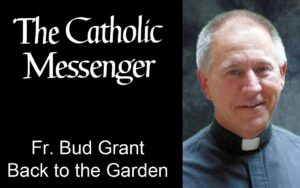By Fr. Bud Grant
The environment is finally emerging as a top flight political issue. The marathon CNN “climate debate” of Democratic primary contenders was newsworthy merely because it happened. California’s CO2 emission standards have drawn the wrath of the EPA … for being too strong. Students are staging a global “climate strike.” Mick Jagger, Donald Sutherland (my generation) and Billie Eilish (definitely not my generation) are calling out heads of state for climate obduracy (not “denial” since they invest so much in debating it). And Greta Thunberg has arrived, via sailing ship, in the U.S.
 Oh, and humans have colonized the moon. O.K., that isn’t a real headline. An Israeli space ship crashed on the moon last April. Amidst the scattered debris are tardigrades (nicknamed “water bears” or, my favorite, “moss piglets”): micro-animals that, by hibernating (sort of), can survive radiation and zero oxygen for very long periods.
Oh, and humans have colonized the moon. O.K., that isn’t a real headline. An Israeli space ship crashed on the moon last April. Amidst the scattered debris are tardigrades (nicknamed “water bears” or, my favorite, “moss piglets”): micro-animals that, by hibernating (sort of), can survive radiation and zero oxygen for very long periods.
They were part of a payload of biological and cultural artifacts deliberately intended to constitute a lunar ark or archive of humanity should something, you know, awful, befall our home planet. Scientists say that although tardigrades can’t reproduce without water, “the so-called pristine ‘environment’ of the moon has been broken” (BBC report).
That’s not quite right. Until now, the moon was not an “environment,” assuming there is (er, “was”) nothing organic there. Yes, we’ve left rubbish (including feces) behind but there was nothing our abiotic garbage could harm. While trashing the place is decidedly not cool, and is, in fact, against international law, it isn’t hurting an ecosystem. But now that we have seeded it with life, albeit micro and dormant, then it is, sort of, an ecosystem. This is historic … and problematic. We’re blindly trashing and crashing our way into galactic immigration.
Professor Monica Grady puts it soberly, “So, it’s not a good thing.”
“Exotheology,” by the way, examines the religious implications of extraterrestrial life. Space, including planets, asteroids, meteorites, comets, etc., is God’s creation. If there is sentient life among the stars (or, for Augustine, among the “antipodes” of a then hypothetically spherical earth), are they “children of Adam” and thus fallen through Original Sin? Do they participate in the universal salvation wrought by Christ or did they — or will they — receive their own Incarnation? Such questions are moot in this case because the life on our moon is terrestrial: we put it there.
Meanwhile a 58-square mile blob of solidified lava is drifting across the Pacific Ocean toward Australia’s Great Barrier Reef, one-half of which was killed off in 2017-18 by an anthropogenic bleaching event. This pumice ark may have picked up various life forms and so could re-seed the dying environment. Some express concern that it will contaminate the reef with invasive species.
That’s also not quite right. The environmental ethical principle is that if nature does it, it is just the random way that God-As-Creator unfolds the mystery of life in the cosmos. There is neither good nor bad in natural processes. But because humans are endowed with a rational conscience designed to govern our actions, human agency is morally culpable. And we do ship invasive flora and fauna across vast spaces, often inadvertently. We have contaminated ecosystems by reducing their indigenous diversity. That’s on us.
Microbic quasi-colonization of the moon, on the other hand, is ethically fraught, not because it harms a pristine ecosystem, but because it inadvertently creates a new one. And if we ever do encounter life in the cosmos, I hope we recognize them as God’s creatures (and they us).
But in the eternities,
Doubtless we shall compare together, hear
A million alien Gospels, in what guise
He trod the Pleiades, the Lyre, the Bear.
O, be prepared, my soul!
To read the inconceivable, to scan
The million forms of God those stars unroll
When in our turn, we show them a Man.
(Alice Meynell, 1923).
(Father Bud Grant is a professor of theology at St. Ambrose University in Davenport.)











